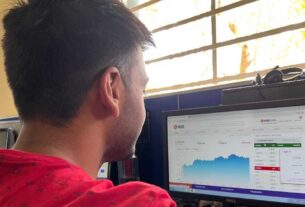Banks are working on facilitating inter-banking transactions to aid the new digital currency.
Banks are in the process of updating their systems to facilitate transactions in the new digital currency. The banks have focused on enabling this system to current account holders like business people first, as their transaction volume is large.
Pooja Chawla, Deputy Branch Manager, Yes bank, Kasturba Gandhi road, said, “The Central Bank Digital Currency(CBDC) is an Ethereum-based token. Ethereum was used to design a secure, safe, and easily traceable transaction. We have updated our systems for current accounts. We are working on updating systems for saving accounts as well.” She added, “Since, in the initial stages the focus is on closed group customers like big merchants and customers who generally operate through current accounts. Therefore, we have first updated the system for current accounts.
She added that they also updated their interface for CBDC so that branches of Yes Bank can achieve interoperability. Interoperability is the ability to make and settle transactions between different bank branches. However, she said they are still working on achieving interoperability within banks.
GK Manohara, Assistant General Manager of the Learning and Development department SBI, main branch office, St. Marks road, Bengaluru, said that they are still working on a mechanism to facilitate inter-banking transactions using the new digital currency as “inter-banking transactions are important to carry out operations in digital currency.”
He also said that the CBDC will likely be used more for secondary market transactions such as buying and selling securities and shares.
Divya Mishra, Professor of Economics, Sophia Girls College, Ajmer said, “It is a great step taken by the RBI. India will become one of the few countries to have a legal CBDC with a sovereign backing.” She said that digital currency will help the unorganized sector as small amount transactions of Rs. 1000 to 5000 cannot be done regularly from a savings bank as they are not traceable. Digital payments will also help small import-export companies as it reduces delay in the transaction.”
She added that the payments done through CBDC will immediately reflect in the person’s account without any delay. Otherwise, transactions through banks take a day to reflect in the person’s account. Anyone can use CBDC without a bank account. She added that the digital currency will not tear apart or get lost like paper currency.
RBI announced the launch of the digital currency, CBDC on Nov. 31 on a pilot basis. RBI selected four banks for the first round: State Bank of India, Yes Bank, IDFC first bank, and ICICI bank.
In the initial stage, it will roll out in four cities, New Delhi, Mumbai, Bengaluru, and Bhubaneswar. RBI can trace every transaction made using the CBDC. This may further aid in India becoming a cashless economy.




